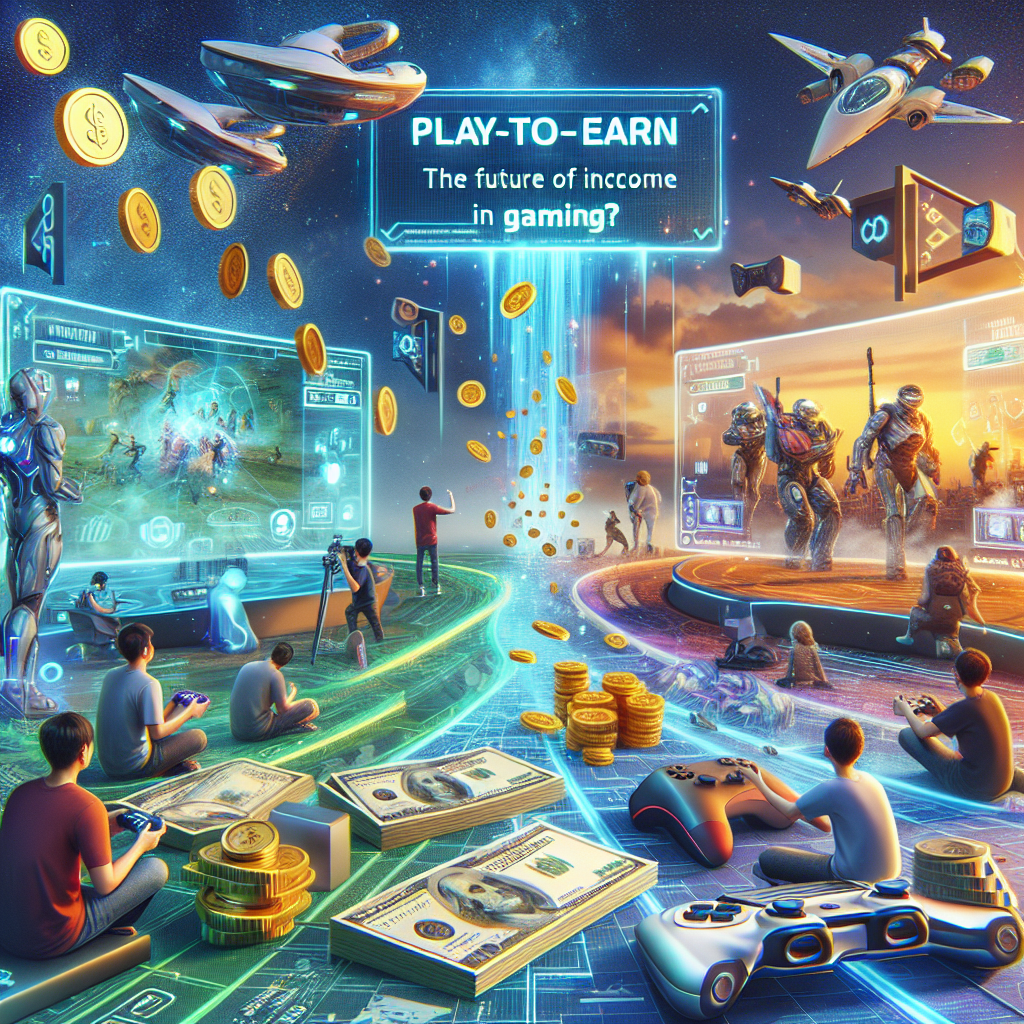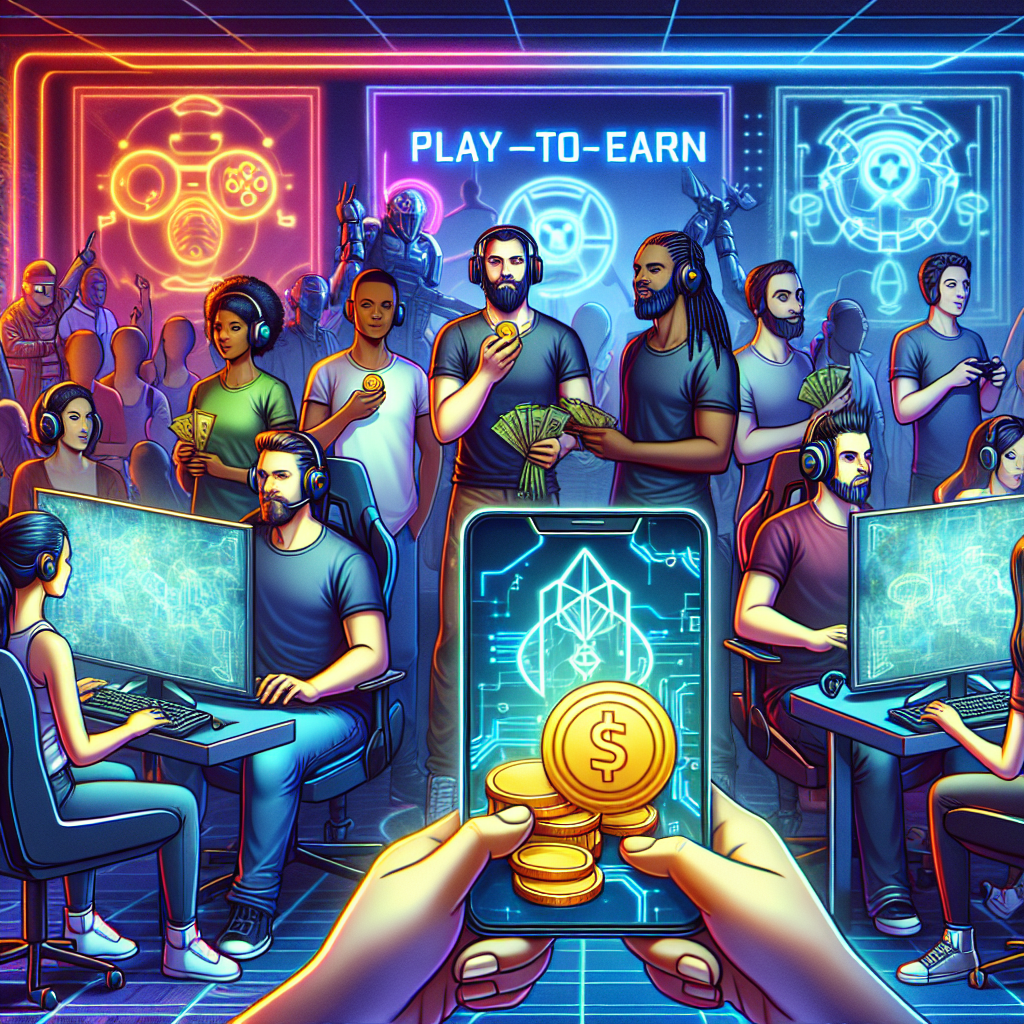The Rise of Play-to-Earn Games in the Gaming Industry
The gaming industry has seen a significant shift in recent years with the rise of play-to-earn games. These games, which allow players to earn real-world income by playing, have gained popularity among gamers looking to monetize their hobby. But what exactly is play-to-earn, and how does it work?
Play-to-earn games are a type of blockchain-based game that allows players to earn cryptocurrency or other digital assets by completing in-game tasks or challenges. These games typically use non-fungible tokens (NFTs) to represent in-game assets, which can be bought, sold, or traded on various online marketplaces. Players can then convert these digital assets into real-world currency, providing them with a source of income from their gaming activities.
One of the key features of play-to-earn games is the concept of ownership. In traditional video games, players do not truly own the in-game items or currency they acquire. However, in play-to-earn games, players have full ownership of their digital assets, allowing them to monetize their gaming experience in a way that was previously not possible.
The potential for earning real-world income through play-to-earn games has attracted a growing number of players to the genre. Some players have even been able to make a full-time living from playing these games, with some earning thousands of dollars per month. This has led to a surge in interest in play-to-earn games from both players and developers alike.
Developers have also taken notice of the potential of play-to-earn games, with many new titles being released in this genre. These games often feature innovative gameplay mechanics and economic systems that allow players to earn rewards for their time and effort. Some games even offer players the opportunity to participate in decentralized autonomous organizations (DAOs), where they can have a say in the development and governance of the game.
While play-to-earn games offer the potential for players to earn real-world income, they are not without their challenges. One of the main concerns surrounding these games is the potential for exploitation and fraud. Some players may be tempted to cheat or exploit the game’s mechanics in order to earn more rewards, while others may fall victim to scams or fraudulent schemes.
Regulatory concerns have also been raised about play-to-earn games, particularly in relation to the use of cryptocurrency and NFTs. Some governments have expressed concerns about the potential for money laundering, tax evasion, and other illegal activities in these games. As a result, developers and players alike must navigate a complex regulatory landscape to ensure that their activities comply with the law.
Despite these challenges, the future looks bright for play-to-earn games. With the growing popularity of blockchain technology and the increasing acceptance of cryptocurrency, play-to-earn games are likely to become an increasingly important part of the gaming industry. As more players discover the potential for earning real-world income through gaming, we can expect to see even more innovative and exciting titles in this genre in the years to come.
In conclusion, play-to-earn games represent a new and exciting frontier in the gaming industry. By allowing players to earn real-world income through their gaming activities, these games have the potential to revolutionize the way we think about gaming and entertainment. While there are challenges to overcome, the future looks bright for play-to-earn games, and we can expect to see even more growth and innovation in this space in the years to come.
How Play-to-Earn Games are Changing the Way Gamers Earn Income

The rise of play-to-earn games has been a game-changer in the gaming industry. These games allow players to earn real money or valuable in-game assets by playing and completing various tasks within the game. This concept has opened up new opportunities for gamers to monetize their skills and time spent playing games. But what exactly are play-to-earn games, and how are they changing the way gamers earn income?
Play-to-earn games, also known as blockchain games, are decentralized games that utilize blockchain technology to enable players to earn rewards in the form of cryptocurrency or non-fungible tokens (NFTs). These rewards can be traded, sold, or used within the game’s ecosystem. The concept of play-to-earn games has gained popularity in recent years, with games like Axie Infinity and Decentraland leading the way.
One of the key features of play-to-earn games is the ability for players to truly own their in-game assets. Unlike traditional games where in-game items are owned by the game developer, play-to-earn games allow players to have full ownership of their assets. This means that players can trade, sell, or use their assets as they see fit, providing them with a sense of ownership and control over their gaming experience.
Another aspect that sets play-to-earn games apart is the potential for players to earn a substantial income. In games like Axie Infinity, players can earn a steady income by breeding, battling, and trading virtual creatures called Axies. Players can then sell their Axies or the resources they have earned for real money, providing them with a source of income that can rival traditional jobs.
The rise of play-to-earn games has also led to the emergence of a new breed of gamers known as “play-to-earn entrepreneurs.” These gamers treat play-to-earn games as a business, investing time and resources into maximizing their earnings within the game. Some players have even formed guilds or communities to collaborate and strategize on how to earn the most rewards from the game.
However, the growing popularity of play-to-earn games has also raised concerns about the potential risks and challenges associated with this new form of gaming. One of the main concerns is the volatile nature of cryptocurrency prices, which can impact the value of in-game assets and the income earned by players. Additionally, the decentralized nature of blockchain games can make it difficult to regulate and enforce rules within the game, leading to issues like fraud and scams.
Despite these challenges, play-to-earn games have the potential to revolutionize the gaming industry and provide new opportunities for gamers to earn income. As more players embrace this concept and developers continue to innovate in this space, play-to-earn games could become a mainstream form of entertainment and income generation in the future.
In conclusion, play-to-earn games are changing the way gamers earn income by providing them with the opportunity to monetize their skills and time spent playing games. With the potential for players to earn a substantial income and truly own their in-game assets, play-to-earn games are reshaping the gaming landscape and creating new possibilities for gamers around the world.
The Future of Gaming: Can Play-to-Earn Games Become a Sustainable Source of Income?
The world of gaming has evolved significantly over the years, with advancements in technology and the rise of online gaming platforms. One of the latest trends in the gaming industry is the concept of Play-to-Earn games, where players can earn real money or digital assets by playing games. This innovative approach has sparked a debate among gamers and industry experts about whether Play-to-Earn games can become a sustainable source of income in the future.
Play-to-Earn games, also known as blockchain games, are built on blockchain technology, which allows for the creation of unique digital assets that can be bought, sold, and traded. In these games, players can earn rewards in the form of cryptocurrencies or non-fungible tokens (NFTs) by completing in-game tasks, challenges, or tournaments. This new model of gaming has attracted a growing number of players who see it as an opportunity to monetize their gaming skills and time.
One of the key advantages of Play-to-Earn games is that they offer players the chance to earn real money while enjoying their favorite games. This has the potential to attract a wider audience of gamers who are looking for ways to supplement their income or even make a living from playing games. Additionally, the decentralized nature of blockchain technology ensures that players have full ownership and control over their digital assets, providing a level of transparency and security that is lacking in traditional gaming models.
However, there are also concerns about the sustainability of Play-to-Earn games as a source of income. Critics argue that the volatile nature of cryptocurrencies and the speculative market for NFTs could pose risks for players who rely on these assets for their livelihood. Moreover, the competitive nature of gaming can make it difficult for players to consistently earn rewards and stay profitable in the long run.
Despite these challenges, some experts believe that Play-to-Earn games have the potential to revolutionize the gaming industry and create new opportunities for players to earn income. By leveraging blockchain technology and smart contracts, game developers can create innovative gameplay mechanics that reward players for their time and skills. This could lead to the emergence of new business models and revenue streams for game developers, as well as new career paths for professional gamers.
In conclusion, the future of Play-to-Earn games as a sustainable source of income remains uncertain. While there are opportunities for players to earn real money and digital assets through these games, there are also risks and challenges that need to be addressed. As the gaming industry continues to evolve, it will be interesting to see how Play-to-Earn games shape the future of gaming and whether they can become a viable source of income for players around the world.


